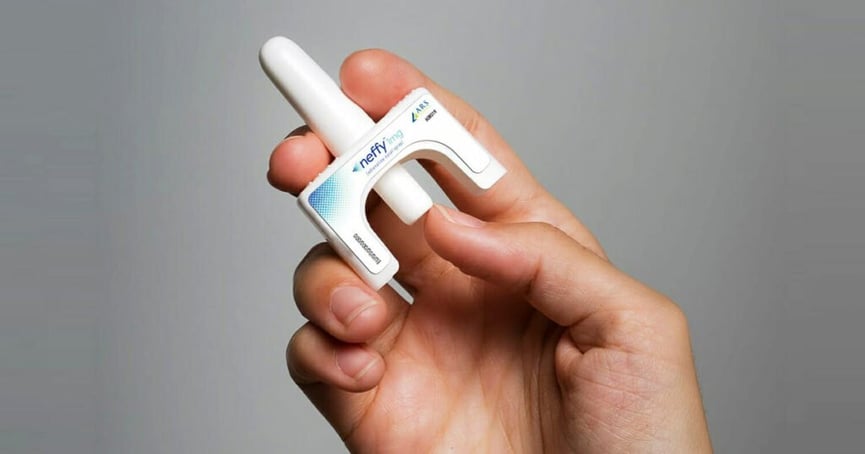FDA Panel Recommends Approval of First Nasal Spray to Combat Severe Allergic Reactions

FRIDAY, May 12, 2023 (HealthDay News) -- Outside advisers for the U.S. Food and Drug Administration voted Thursday to recommend approval of Neffy, the first epinephrine nasal spray for severe allergic reactions.
Although most of the Pulmonary-Allergy Drugs Advisory Committee members supported the spray for adults (16:6) and children (17:5), key questions linger about whether more data are needed from its maker, ARS Pharmaceuticals, CBS News reported.
But Richard Lowenthal, cofounder, president, and CEO at ARS, said in a company statement following the vote, "We believe our clinical data from more than 600 individuals demonstrate Neffy's absorption-enhancing nasal spray technology is comparable to injectable products in delivering potentially lifesaving epinephrine, but with unique advantages of being small, needle-free, and conveniently sized."
Neffy delivers a 2-mg dose of epinephrine. Instead of large clinical trials, the drug company compared its product to already approved injectable epinephrine products, such as the EpiPen. It showed the results for Neffy were neither substantially higher or lower than injectable epinephrine.
"The effects of epinephrine on blood pressure and heart rate are surrogates for efficacy and are important in determining if someone is responding to treatment," Carlos Camargo, M.D., a professor of emergency medicine at Harvard Medical School in Boston, said in the company's news release. "With Neffy, blood pressure and heart rate are comparable to EpiPen with a single dose -- and with a second dose of Neffy, increases in systolic blood pressure were statistically higher, even better than revealed in the available data from EpiPen, which is crucial for patients requiring a second dose for a severe allergic reaction."
Epinephrine has been used since 1901 via injection. It was never put through the same approval process as drugs are now because it was on the market before the FDA existed, CBS News reported. That means the FDA does not have a lot of data it can use to compare Neffy's effectiveness in saving patients who are having a severe allergic reaction. As a result, it is not entirely clear whether the nasal spray will work as well as injectable epinephrine.
The FDA is expected to make its decision on whether to approve Neffy by the middle of this year. The company has said it could start selling the spray in late 2023. The drug is designed to work for patients who weight at least about 66 lb.
The company's research included a survey showing that people would be likely to use the spray 18 minutes earlier than an injectable medication, and as many as 35 percent more people would carry it with them.
Related Posts
Comprenden cómo la COVID puede provocar la pérdida del olfato
JUEVES, 5 de mayo de 2022 (HealthDay News) -- Le ha sucedido a millones durante...
Las pruebas de frotis nasal para niños realizadas por los padres dan resultados precisos, según un estudio
VIERNES, 12 de noviembre de 2021 (HealthDay News) -- Las muestras de frotis...
Rate of Pregnant U.S. Women Who Have Diabetes Keeps Rising
THURSDAY, June 1, 2023 (HealthDay News) -- The number of American women who have...
More Steps Per Day, Lowered Odds for Diabetes in Women
FRIDAY, Dec. 23, 2022 (HealthDay News) – Move your body every day to guard...
